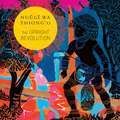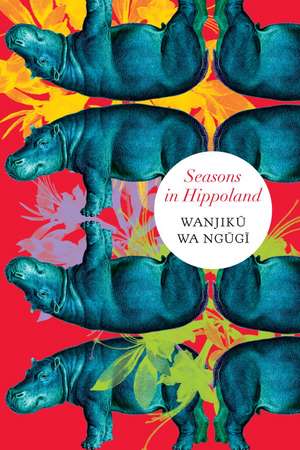Seasons in Hippoland: The Africa List
Autor Wanjiku Wa Ngugien Limba Engleză Hardback – 5 dec 2021
Victoriana is a country ruled by an Emperor-for-Life who is dying from an illness not officially acknowledged in a land where truth and facts are decided by the Emperor. The elite goes along with the charade. Their children are conditioned to conform. It is a land of truthful lies, where reality has uncertain meaning.
Mumbi, a rebellious child from the capital of Westville, and her brother are sent to live in rural Hippoland. But what was meant to be a punishment turns out to be a glorious discovery of the magic of the land, best captured in the stories their eccentric aunt Sara tells them. Most captivating to the children is the tale of a porcelain bowl supposed to possess healing powers. Returning to Westville as an adult, Mumbi spreads the story throughout the city and to the entire country. Exhausted by years of endless bleak lies, the people are fascinated by the mystery of the porcelain bowl. When word of its healing powers reaches the Emperor himself, he commands Mumbi to find it for him—with dramatic consequences for everyone in Victoriana.
Captivating and enchanting, Seasons in Hippoland plays with the tradition of magic realism. Every image in this novel is a story, and every story is a call for resistance to anyone who tries to confine our imagination or corrupt our humanity.
Din seria The Africa List
-
 Preț: 294.38 lei
Preț: 294.38 lei -
 Preț: 140.77 lei
Preț: 140.77 lei -
 Preț: 77.57 lei
Preț: 77.57 lei -
 Preț: 117.62 lei
Preț: 117.62 lei -
 Preț: 386.32 lei
Preț: 386.32 lei -
 Preț: 131.33 lei
Preț: 131.33 lei -
 Preț: 180.84 lei
Preț: 180.84 lei -
 Preț: 102.49 lei
Preț: 102.49 lei -
 Preț: 118.15 lei
Preț: 118.15 lei -
 Preț: 103.12 lei
Preț: 103.12 lei -
 Preț: 93.35 lei
Preț: 93.35 lei -
 Preț: 300.07 lei
Preț: 300.07 lei - 19%
 Preț: 99.88 lei
Preț: 99.88 lei - 19%
 Preț: 119.60 lei
Preț: 119.60 lei - 17%
 Preț: 133.47 lei
Preț: 133.47 lei - 17%
 Preț: 133.47 lei
Preț: 133.47 lei - 19%
 Preț: 80.96 lei
Preț: 80.96 lei - 18%
 Preț: 92.21 lei
Preț: 92.21 lei - 20%
 Preț: 74.41 lei
Preț: 74.41 lei -
 Preț: 164.05 lei
Preț: 164.05 lei
Preț: 135.81 lei
Nou
Puncte Express: 204
Preț estimativ în valută:
25.99€ • 27.03$ • 21.46£
25.99€ • 27.03$ • 21.46£
Carte disponibilă
Livrare economică 22 martie-05 aprilie
Livrare express 11-15 martie pentru 40.56 lei
Preluare comenzi: 021 569.72.76
Specificații
ISBN-13: 9780857428943
ISBN-10: 0857428942
Pagini: 248
Dimensiuni: 152 x 229 x 23 mm
Greutate: 0.43 kg
Editura: Seagull Books
Colecția Seagull Books
Seria The Africa List
ISBN-10: 0857428942
Pagini: 248
Dimensiuni: 152 x 229 x 23 mm
Greutate: 0.43 kg
Editura: Seagull Books
Colecția Seagull Books
Seria The Africa List
Notă biografică
Wanjikũ Wa Ngũgĩ is the author of the novel The Fall of Saints and former director of the Helsinki African Film Festival. Her short stories and essays have appeared in Nairobi Noir, Houston Noir, and St. Petersburg Review, among others.
Extras
At thirteen, I found myself living in the middle of marshlands. Legend has it that the slow-moving water once held hundreds of gliding mammals. The sun bounced off their eyes, ears and nostrils held above the water, as the creatures waited for dusk in order to pounce on the rushes, reeds and shrubs on the edges. Their gray hide glistened under the moonlight, like shriveled potatoes from too many hours in the water. It was strange how they flung their dung around to mark territory, a sign that evaded the invaders who settled several miles north in Londonshire after they had driven the animals to extinction. But urban lore had it that the hippo lived in the upper south secretly and only came out during the super-moons. The town, named Hippoland in their honor, was nestled between Westville and Londonshire.
Those who toiled in Londonshire and Westville came from Hippoland. They sold their human power cheaply, like the hundreds of Indian men before them, who had arrived in ships and dhows and built with their bare hands the rail-way line that eased travel between Westville and London-shire and all across Victoriana. Some of the Indian workers survived the heat strokes and wild game, and finally settled in Hippoland, waiting for the largesse they had been promised to trickle down to them. They started selling mahamris and hippo tusks and skins and, of course, spices, and thus forever impacted the cuisine of the land.
They married the locals and together they built dress shops, bicycle shops, dairy shops, paraffin stops, and market stalls, temples, churches, bars and so in time they became part of the social fabric of Hippoland. Everyone else in Hippoland worked in Westville or Londonshire and brought back stories of surfeit and shared them at the Saturday foot-ball games, or in the Mexico 86 beer hall, named after the soccer World Cup, held in the Central American city.
Mexico 86 was a simmering pot in which stories from Westville and Londonshire were stewed, strained, mixed and served up to neighbors, friends and foes, especially after the sun had slowly disappeared behind the hills surrounding Hippoland. It was also a shelter from the cold air and rain. Mexico 86 was always dimly lit, with cigarette smoke meandering around the silhouettes huddled around over-flowing ashtrays, beer bottles and left-over chicken on the wooden tables. Clients sipped their fair share of Miti wine made from water, sugar cane, organic honey, and fermented n wooden drums, and served in calabashes and cow horns, a reminder of eras before the Empire set foot.
The older patrons, most of them retirees who had spent nearly all their savings chasing their pension – earned by risking limbs for the Empire in Burma—held their board meetings at Mexico 86 on most evenings. On other nights, there was were just gossip, song and dance.
It was like that for a long time. But when the juke box gave in after years of service, some of the evenings turned literary. When Westville banned a book, the dwellers of Hippoland wanted to know why, so someone smuggled a copy into Mexico 86. And that is how Mexico 86 became the center of stories, factual, fictional or a mixture of both.
And this is why I think Aunt Sara is quite the storyteller. I did not know this when I met her. I did not even know I had an aunt of that name until my father told me that hers was going to be our place of exile. My brother Mito and I.
Those who toiled in Londonshire and Westville came from Hippoland. They sold their human power cheaply, like the hundreds of Indian men before them, who had arrived in ships and dhows and built with their bare hands the rail-way line that eased travel between Westville and London-shire and all across Victoriana. Some of the Indian workers survived the heat strokes and wild game, and finally settled in Hippoland, waiting for the largesse they had been promised to trickle down to them. They started selling mahamris and hippo tusks and skins and, of course, spices, and thus forever impacted the cuisine of the land.
They married the locals and together they built dress shops, bicycle shops, dairy shops, paraffin stops, and market stalls, temples, churches, bars and so in time they became part of the social fabric of Hippoland. Everyone else in Hippoland worked in Westville or Londonshire and brought back stories of surfeit and shared them at the Saturday foot-ball games, or in the Mexico 86 beer hall, named after the soccer World Cup, held in the Central American city.
Mexico 86 was a simmering pot in which stories from Westville and Londonshire were stewed, strained, mixed and served up to neighbors, friends and foes, especially after the sun had slowly disappeared behind the hills surrounding Hippoland. It was also a shelter from the cold air and rain. Mexico 86 was always dimly lit, with cigarette smoke meandering around the silhouettes huddled around over-flowing ashtrays, beer bottles and left-over chicken on the wooden tables. Clients sipped their fair share of Miti wine made from water, sugar cane, organic honey, and fermented n wooden drums, and served in calabashes and cow horns, a reminder of eras before the Empire set foot.
The older patrons, most of them retirees who had spent nearly all their savings chasing their pension – earned by risking limbs for the Empire in Burma—held their board meetings at Mexico 86 on most evenings. On other nights, there was were just gossip, song and dance.
It was like that for a long time. But when the juke box gave in after years of service, some of the evenings turned literary. When Westville banned a book, the dwellers of Hippoland wanted to know why, so someone smuggled a copy into Mexico 86. And that is how Mexico 86 became the center of stories, factual, fictional or a mixture of both.
And this is why I think Aunt Sara is quite the storyteller. I did not know this when I met her. I did not even know I had an aunt of that name until my father told me that hers was going to be our place of exile. My brother Mito and I.
Recenzii
“Kenyan author Wanjikũ Wa Ngũgĩ tells an incandescent tale of Mumbi, sent to live in Hippoland as a child. Once grown, Mumbi returns to her homeland to relate a magical story that challenges their understanding and imagination.”
"Part fairy tale, part political parable, Seasons in Hippoland is a powerful novel whose women are resilient and creative in the face of oppression."
“Takes readers to the fictional African nation of Victoriana, where one woman’s childhood stories threaten to change everything for her people, who have long lived under the rule of the deceitful Emperor-for-Life.”
